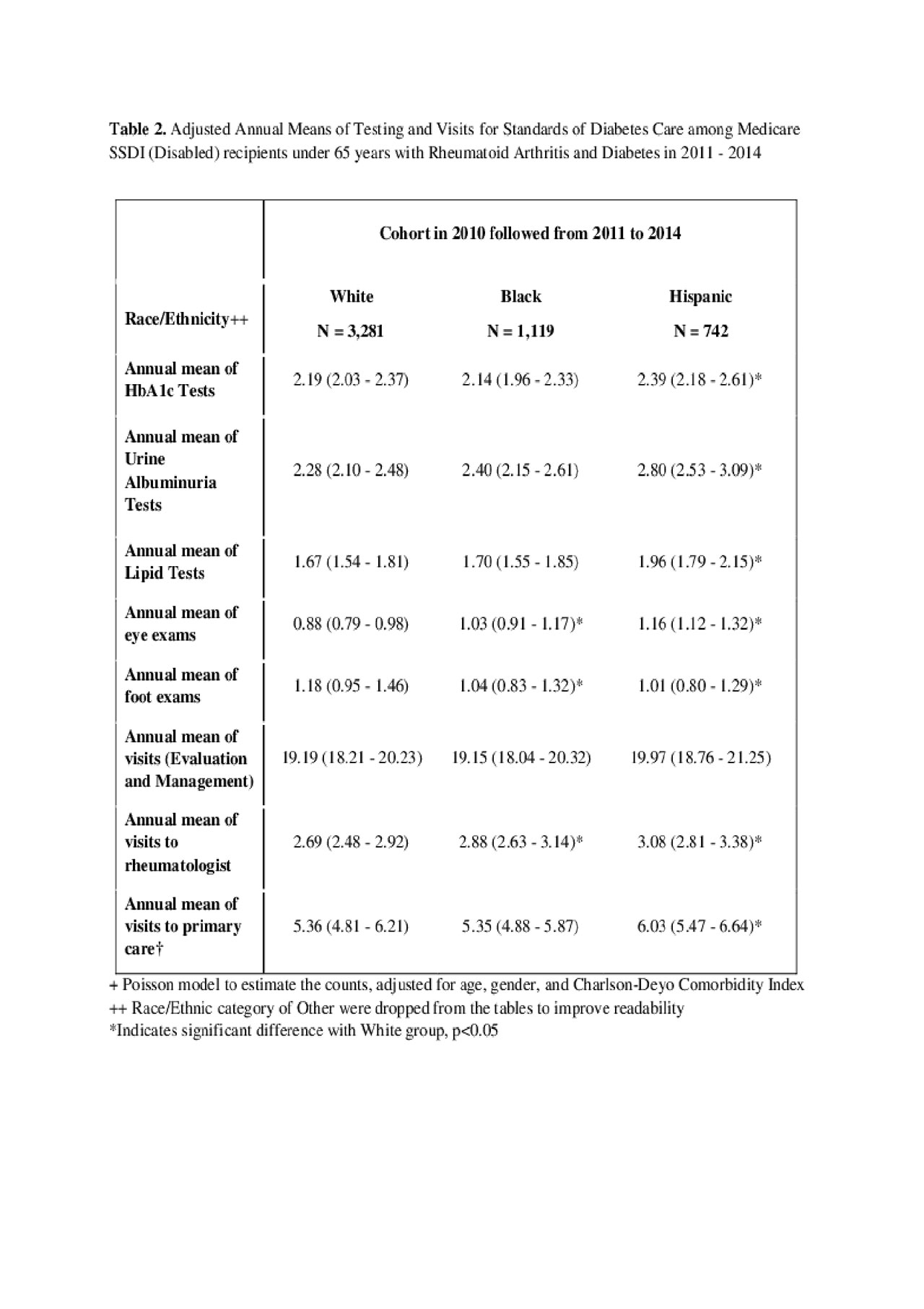Session Information
Session Type: Poster Session (Sunday)
Session Time: 9:00AM-11:00AM
Background/Purpose: Medicare beneficiaries who are disabled (coverage by the Social Security Disability Insurance (SSDI)) with rheumatoid arthritis (RA) and diabetes mellitus (DM) and under 65 years of age are complex patients with heavy healthcare use. These young disabled patients cost 31% more than older Medicare patients, but we do not know whether they are receiving the basic standards of diabetes care given their disability and complexities related to also having RA. Our purpose was to assess the standard of care for diabetes measured by health services utilization in patients under 65 years of age who are disabled with RA and DM by race and ethnicity.
Methods: We conducted a longitudinal analysis from 2010– 2014 of patients who were beneficiaries of the SSDI with both RA and DM. RA was defined in 2010 as either 1) two RA diagnoses (ICD9-714.xx) by a rheumatologist between 7 and 365 days apart; OR 2) one RA diagnosis by a rheumatologist and at least 1 prescription for a disease modifying anti-rheumatic drug. DM was defined as one diagnosis from any physician (ICD-9 250.xx) in 2010. Patients were followed for 4 years (2011 – 2014) and outcomes were the testing and visit standards defined by the 2010 American Diabetes Association. We used Poisson models to adjust for age, gender, and Charlson-Deyo Comorbidity Index and examined the differences between racial/ethnic groups.
Results: In 2010, there were 5,380 patients under the age of 65 disabled with RA and DM receiving SSDI benefits. The cohort was 78% female and 61% had 5 or more comorbidities. These patients had high health services utilization with a mean number of visits to the doctor of about 18 visits a year (Table 1). More than half (53.5%) of all patients did not receive a foot exam and almost a quarter (23.3%) did not receive an eye exam in 2011-2014. After multivariable adjustment, Hispanic patients had a statistically significant higher annual mean of testing (HbA1c 2.39 vs 2.19, urine albuminuria 2.8 vs 2.28, and lipid 1.96 vs 1.67) than White patients in 2011-2014 (Table 2). Both Hispanic and Black patients had a higher annual mean of eye exams (1.16 and 1.03, respectively, vs 0.88) but lower annual mean of foot exams (1.01 and 1.04, respectively, vs 1.18) than the White patients.
Conclusion: Disabled patients with RA and DM had high utilization of health services and received most of the recommended standard of care for diabetes, which was similar across all racial/ethnic groups. The exception was for eye exams, which was lower among Whites. However, there was low utilization of specialty services related to DM care such as ophthalmology evaluations or foot exams by any physician.
To cite this abstract in AMA style:
Lui G, Rajan M, Kern L, Pinheiro L, Safford M, Curtis J, Navarro-Millan I. Health Services Utilization as Recommended by the American Diabetes Association Among Middle-Aged Patients Disabled with Rheumatoid Arthritis and Diabetes Mellitus [abstract]. Arthritis Rheumatol. 2019; 71 (suppl 10). https://acrabstracts.org/abstract/health-services-utilization-as-recommended-by-the-american-diabetes-association-among-middle-aged-patients-disabled-with-rheumatoid-arthritis-and-diabetes-mellitus/. Accessed .« Back to 2019 ACR/ARP Annual Meeting
ACR Meeting Abstracts - https://acrabstracts.org/abstract/health-services-utilization-as-recommended-by-the-american-diabetes-association-among-middle-aged-patients-disabled-with-rheumatoid-arthritis-and-diabetes-mellitus/


